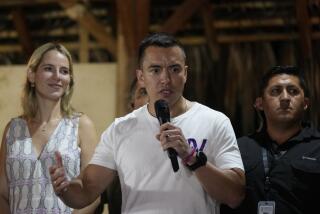Nigeria Ready for Government to Work
- Share via
LAGOS, Nigeria — The consensus is that Nigeria’s recent presidential elections were far from perfect. But in the eyes of analysts and average people, what counts is that Africa’s most populous nation has taken a significant step toward democracy that gives it a chance to start tackling its vast problems.
A civilian leader, retired army Gen. Olusegun Obasanjo, has been elected for the first time in 15 years. Millions of Nigerians had enough faith in the prospects of a democratic future to vote Feb. 27. The absence of widespread violence or disruption of the elections pointed to an increased level of sophistication and tolerance among competing parties.
There is a sense of relief that the elections are over. Although many people are fed up with the military and uncertain of Obasanjo because of the army’s history of corruption and misrule, Nigerians now hope the new government will get down to work.
“The transition to democracy has kicked off,” said Olisa Agbakoba, a human rights lawyer and veteran pro-democracy activist. “The challenge is to deepen democratic processes.”
“The [elections] represent a real expansion of political space,” Kenneth Wollack, president of the Washington-based National Democratic Institute for International Affairs, said in a recent discussion in Lagos, Nigeria’s main commercial city. “The question is if you can take hold of that and build on that. It’s the beginning of a process. It’s a step in the right direction.”
Obasanjo ruled Nigeria once before, from 1976 to 1979, as a military officer before voluntarily handing power to an elected civilian government. This time, he is scheduled to take over from military ruler Gen. Adulsalami Abubakar on May 29.
Olu Falae, a onetime finance minister who challenged Obasanjo for the presidency, has deemed the elections a farce and threatened to take the matter to court.
But international observers said that supporters of both candidates were involved in vote-rigging and that the irregularities probably did not affect the outcome.
Nigerians simply want to move on.
“They’re fed up with military rule,” said Jean Herskovits, a professor of African history at the State University of New York at Purchase.
“They are desperate for someone who will do something about their economic plight,” said Herskovits, who helped monitor the elections. “Obasanjo is certainly a president with a lot of experience. We can only wish him the best of luck in dealing with Nigeria’s problems, which are terrible at the moment.”
Phone lines barely work, and water and electricity are constantly in short supply. Corruption and government mismanagement, coupled with a drop in world oil prices, have left Nigeria with a budget deficit of almost $400 million.
Obasanjo has promised to begin a program of national reconstruction focusing on boosting food and agricultural production, to revive universal elementary school education, promote investment and privatization that would lead to the creation of more jobs, strengthen local and state government, and restructure the economy to exploit Nigeria’s vast natural resources besides oil. Oil currently accounts for at least 90% of export revenue.
The president-elect has also pledged to end corruption and heal Nigeria’s dangerous ethnic divisions.
“I regard the results of this election as a mandate from the people of Nigeria and the command from God almighty . . . that I should rebuild this nation,” he told supporters in the capital, Abuja, after his election.
He may be able to bring some unity to Nigeria. Although Obasanjo is widely disliked among his own Yoruba southwesterners, he has gained much support among the northern Hausa and Fulani, who have long dominated the military, and the Ibo-dominated east.
If he eventually succeeds in winning over his clansmen, this would do much to build national accord.
Supporters argue that Obasanjo’s track record during his previous regime proves that he is capable of fulfilling his promises.
The retired general boasts of having left behind 20 years ago “a nation with purpose, a workable constitution, a military institution with honor and professionalism, a healthy economy with robust reserve, a conviction that government can honor its commitments, an independent and courageous judiciary, a nation that commanded international respect . . . in which every citizen had a hope and chance of self-fulfillment.”
Critics caution that Nigeria should expect something less from Obasanjo. They doubt he will launch widespread investigations into military officers who have stolen public funds because many of them helped finance his presidential campaign.
Though praised as a “benevolent dictator” during his previous tenure, Obasanjo is still blamed by critics for his regime’s Land Use Decree, which was initially intended to promote development in mineral-rich areas but ended up being a weapon for the government to freely exploit private land.
Corruption also was prevalent, though not as rampant as in later military regimes. Obasanjo’s earlier term of office also is remembered for the introduction of the country’s National Security Organization, which later became the notoriously repressive internal security service.
For now, Obasanjo seems to have won the backing of the international community. Further support depends on how he governs. Resolve in fighting corruption, combined with the shift to democratic rule, could bring in billions of dollars from foreign donors and investors.
More to Read
Sign up for Essential California
The most important California stories and recommendations in your inbox every morning.
You may occasionally receive promotional content from the Los Angeles Times.














